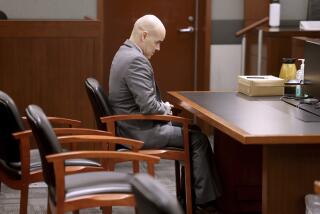Prosecutors Investigate Writer Who Taped Suicidal Man
- Share via
Florida state prosecutors questioned a fired Miami Herald columnist Friday, trying to determine whether he had committed a crime by surreptitiously recording his conversation with a former city official who minutes later killed himself in the newspaper’s lobby.
The decision by prosecutors to conduct the inquiry was the latest in a series of blows absorbed by the Miami newspaper in the two days since the suicide of Arthur E. Teele Jr., 58, a former Miami city commissioner despondent over his role in a widening corruption scandal.
For the record:
12:00 a.m. Aug. 3, 2005 For The Record
Los Angeles Times Wednesday August 03, 2005 Home Edition Main News Part A Page 2 News Desk 1 inches; 57 words Type of Material: Correction
Miami suicide -- An article in Saturday’s Section A about the suicide of a former Miami official said Arthur E. Teele Jr. shot himself as a Miami weekly newspaper was preparing a report detailing allegations of corruption. The report was published the day of Teele’s suicide. The Times article also said Teele was 58. He was 59.
From the moment Teele walked into the Herald lobby Wednesday evening and shot himself with a handgun, the newspaper’s staff has been scrambling to report what happened and learn more about an investigation that centered on Teele’s alleged penchant for bribes, mistresses and male prostitutes.
But Jim DeFede, 42, also became a casualty of the events spawned by Steele’s death. Herald executives fired the veteran Florida columnist after he told them that he had taped Teele without his permission when the politician became distraught during the conversation.
Under Florida law, individuals are prohibited from recording a conversation unless both parties agree to it. The law is similar to one in California and several other states.
The Herald’s acknowledgment that it had dismissed DeFede for possible criminal violations prompted swift interest from the Miami-Dade state attorney’s office. DeFede and a lawyer met voluntarily for several hours Friday with prosecutors from the office’s public corruption unit.
Ed Griffith, a Miami-Dade spokesman, said many of the prosecutors’ questions centered on Teele’s suicide, but that questions also touched on DeFede’s actions.
Even as Herald reporters worked to learn more about Teele and his internal demons, they also were protesting DeFede’s firing, circulating an online petition for his rehiring.
“The punishment didn’t fit the offense,” said Charlie Savage, a Boston Globe reporter who is among several former Herald staffers leading the effort to get the paper to rehire DeFede. “Jim made a mistake in haste and I think the Herald management also acted in haste in firing him.”
In a column that circulated around the Herald newsroom Friday and which is expected to run in the newspaper Sunday, Executive Editor Tom Fiedler defended DeFede’s firing, insisting the columnist knowingly violated the newspaper’s ethics and possibly broke the law.
“What Jim acknowledged doing violated one of the most fundamental tenets of journalistic ethics, which holds that in all our dealings we act without hidden motives or practices,” Fiedler wrote. “Especially troubling to me was Jim’s admission that he turned on his tape recorder at a moment when Teele was clearly agitated, when his thoughts were disconnected, rambling, incoherent.”
Michael S. Overing, an attorney who teaches media law at the USC Annenberg School for Communication, said that if an employee broke the law while gathering news, it could expose the newspaper to legal liability. To deflect that, Overing said, “management wants to show that they’ve taken quick, corrective action.”
In a telephone interview Friday night, DeFede said he had told prosecutors and Herald executives that he taped Teele on instinct when the city official called him Wednesday, sensing that the politician was coming apart emotionally.
“All I had in my mind was that something was terribly wrong with Art and I wasn’t thinking whether it was right or wrong or legal or illegal, and I just hit the button,” DeFede said. “It was instinctive. I wanted to preserve it the same way you’d want to preserve a 911 call.”
Teele was arraigned five days earlier on federal corruption charges and had also been accused of taking kickbacks on government land deals. On the day of his suicide, the weekly Miami New Times was preparing an account that alleged Teele had amassed thousands in illegal funds, stored cash in Gucci bags and spent it on mistresses and male prostitutes.
More to Read
Sign up for Essential California
The most important California stories and recommendations in your inbox every morning.
You may occasionally receive promotional content from the Los Angeles Times.













